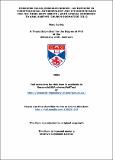Files in this item
Embodied souls, ensouled bodies : an exercise in christological anthropology and its significance for the mind/body debate ; with special reference to Karl Barth's 'Church dogmatics' III/2
Item metadata
| dc.contributor.advisor | Torrance, Alan J. | |
| dc.contributor.author | Cortez, Marc | |
| dc.coverage.spatial | 257 p. | en |
| dc.date.accessioned | 2006-12-18T16:30:31Z | |
| dc.date.available | 2006-12-18T16:30:31Z | |
| dc.date.issued | 2006-10 | |
| dc.identifier | uk.bl.ethos.551950 | |
| dc.identifier.uri | https://hdl.handle.net/10023/145 | |
| dc.description.abstract | Contemporary developments in cognitive neuroscience are having a profound impact on the philosophy of mind as philosophers work to understand the implications of these advances for appreciating what it means to be a human person. At the same time, a recent consensus has formed among contemporary theologians around the thesis that Jesus Christ is the revelation of what it means to be truly human. Unfortunately, very few thinkers have made any concerted effort to bring these two developments into dialogue with one another. This study addresses this lack by drawing on the anthropological insights of Karl Barth and bringing them to bear on certain aspects of the contemporary discussions regarding the mind/brain relationship. The thesis thus comprises two major sections. The first develops an understanding of Karl Barth’s theological anthropology focusing on three major facets: (1) the centrality of Jesus Christ for any real understanding of human persons; (2) the resources that such a christologically determined view of human nature has for engaging in interdisciplinary discourse; and (3) the ontological implications of this approach for understanding the mind/body relationship. The second part of the study then draws on this theological foundation to consider the implications that understanding human nature christologically has for analyzing and assessing several prominent ways of explaining the mind/body relationship. This study, then, is an exercise in understanding the nature of a christocentric anthropology and its implications for understanding human ontology. While it will devote significant attention to the theology of Karl Barth and various contemporary philosophers of mind, its fundamental aim is to draw together these apparently disparate fields of inquiry by engaging both theology and philosophy in a vital dialogue on the nature of the human person as revealed in the person and work of Jesus Christ. | en |
| dc.format.extent | 1605601 bytes | |
| dc.format.mimetype | application/pdf | |
| dc.language.iso | en | en |
| dc.publisher | University of St Andrews | |
| dc.rights | Creative Commons Attribution-NonCommercial-NoDerivs 2.5 Generic | |
| dc.rights.uri | http://creativecommons.org/licenses/by-nc-nd/2.5/ | |
| dc.subject | Theological anthropology | en |
| dc.subject | Christocentric anthropology | en |
| dc.subject | Human ontology | en |
| dc.subject | Philosophy of mind | en |
| dc.subject.lcc | BT702.C7 | |
| dc.subject.lcsh | Barth, Karl,1886-1968 | |
| dc.subject.lcsh | Jesus Christ--Person and offices | |
| dc.subject.lcsh | Human beings | |
| dc.subject.lcsh | Mind and body | |
| dc.subject.lcsh | Religion and science | |
| dc.subject.lcsh | Theological anthropology--Christianity | |
| dc.title | Embodied souls, ensouled bodies : an exercise in christological anthropology and its significance for the mind/body debate ; with special reference to Karl Barth's 'Church dogmatics' III/2 | en |
| dc.type | Thesis | en |
| dc.type.qualificationlevel | Doctoral | en |
| dc.type.qualificationname | PhD Doctor of Philosophy | en |
| dc.publisher.institution | The University of St Andrews | en |
This item appears in the following Collection(s)
Except where otherwise noted within the work, this item's licence for re-use is described as Creative Commons Attribution-NonCommercial-NoDerivs 2.5 Generic
Items in the St Andrews Research Repository are protected by copyright, with all rights reserved, unless otherwise indicated.


